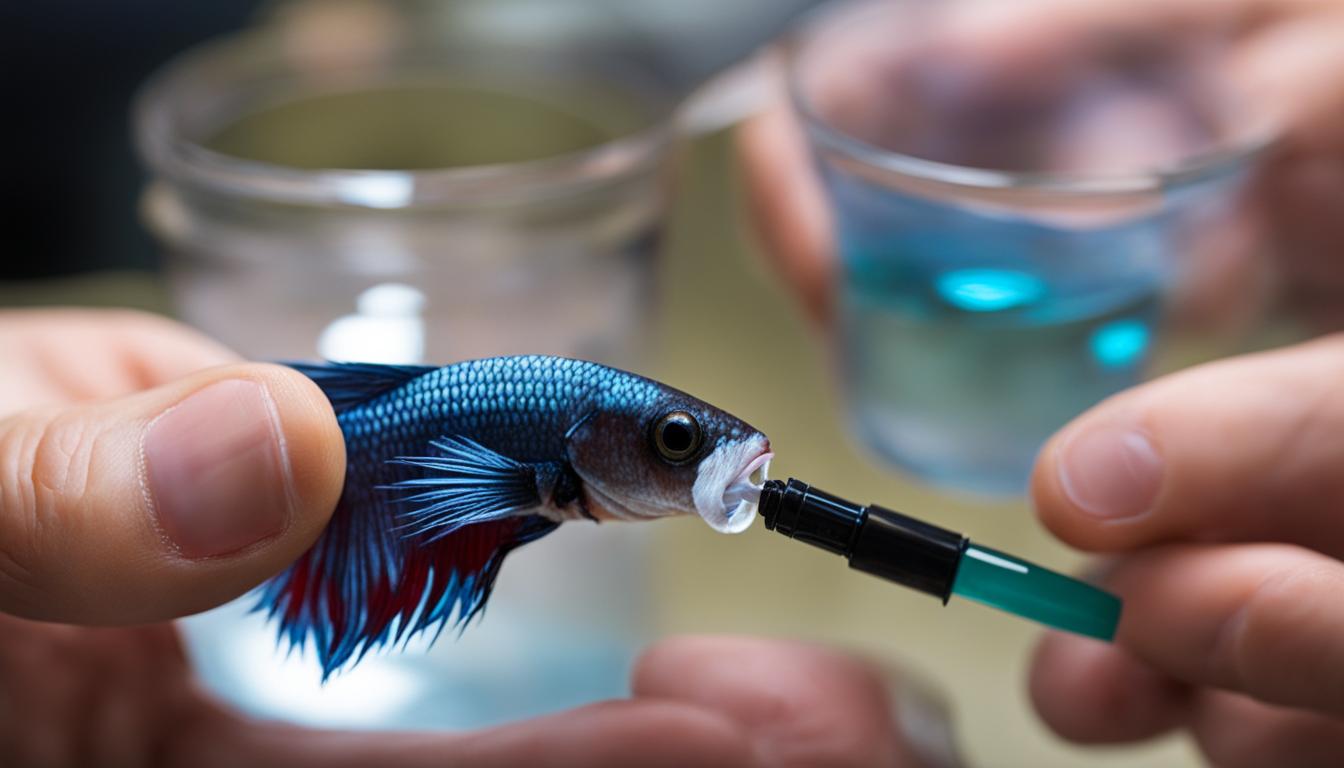Last Updated on 2 years by admin
As a Betta fish owner, it can be alarming to notice that your fish has developed Popeye, a condition where their eyes become swollen and protrude from their sockets. However, Popeye is a common condition that can be effectively treated with the right care and attention. In this comprehensive guide, we’ll cover everything you need to know to help your Betta fish recover from Popeye and prevent future occurrences of this condition.
Key Takeaways:
- Popeye is a common condition in Betta fish that can be effectively treated with proper care and attention
- Providing the right environment and identifying underlying issues can support the healing process
- Both non-medicated and medicated treatment options are available for Popeye
- Prevention is key to reducing the risk of future occurrences of Popeye in Betta fish
- Ongoing care and attention can support your Betta fish’s recovery and overall health
Understanding Popeye in Betta Fish
Betta fish are a popular species of aquarium fish known for their vibrant colors and graceful movements. However, just like any other pet, Betta fish are susceptible to health issues, one of which is Popeye.
Betta fish popeye cure, betta fish eye infection treatment, and treating popeye in betta fish are common search terms among pet owners looking for ways to address this condition. In this section, we will provide a comprehensive understanding of Popeye in Betta fish, including its causes, symptoms, and potential complications.
What is Popeye in Betta Fish?
Popeye, also known as exophthalmia, is a condition that affects a Betta fish’s eyes. In simple terms, it refers to the swelling of one or both eyes, causing them to bulge out of the eye socket.
The condition can affect both the young and adult Betta fish, and it can occur in both male and female fish.
Causes of Popeye in Betta Fish
Understanding the underlying causes of Popeye in Betta fish is crucial for effective treatment. Some of the common causes of this eye condition include the following:
- Poor water quality
- Bacterial and fungal infections
- Physical injuries
- Parasitic infestations
- Viral infections
Betta fish that are kept in dirty tanks or bowls are at a higher risk of developing Popeye due to the accumulation of harmful bacteria and other pathogens.
Physical injuries can occur due to rough handling, sharp objects in the tank, or aggression from other fish in the same tank. Parasitic infestations and viral infections can also lead to Popeye in Betta fish.
Symptoms of Popeye in Betta Fish
Popeye in Betta fish is easy to identify. The most noticeable symptom is the swelling of one or both eyes, causing them to bulge out of the eye socket. Other symptoms may include:
- Cloudy eyes
- Discoloration of the eyes
- Bulging eyes
- Decreased appetite
- Lethargy
- Difficulty swimming
If left untreated, Popeye in Betta fish can lead to other health complications, including blindness and death.
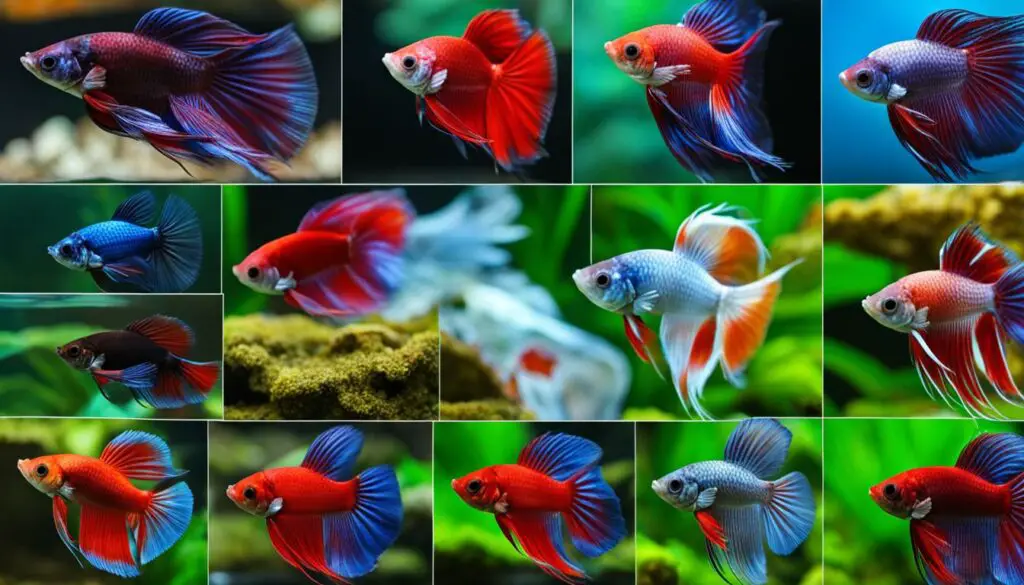
“Early detection and timely intervention are key to the well-being of your fish.”
Creating the Ideal Environment for Healing
Providing an optimal environment for your Betta fish is crucial for popeye recovery. Here are some key factors to consider:
| Factor | Details |
|---|---|
| Clean water | Regularly change 25-50% of the water in the tank and use a filter to maintain water quality. |
| Proper tank setup | Ensure the tank is appropriately sized, has hiding places, and provides enough space for swimming. |
| Stress-reducing measures | Reduce stress by avoiding loud noises, sudden movements, and overcrowding in the tank. |
It’s also important to keep an eye on the temperature of the water, as warmer water can help boost the immune system and promote healing. Aim for a temperature range between 76-82°F (24-28°C).
Creating a calm environment can help your Betta fish heal faster. Consider adding some live or silk plants to the tank, which can also help to reduce stress.
By following these simple steps, you can create an ideal environment for your Betta fish to recover from popeye.
Next, we will explore how to diagnose and identify potential underlying issues associated with popeye in Betta fish.
Diagnosis and Identifying Underlying Issues
Correctly diagnosing Popeye in Betta fish is crucial for implementing effective treatment options. In this section, we will explore the various factors that can contribute to this eye condition and how to identify them.
Causes of Popeye in Betta Fish
Popeye can occur due to a variety of reasons, including poor water quality, bacterial infections, and physical trauma to the eye. Stress and underlying health issues can also be contributing factors. Identifying the cause of Popeye is essential for selecting the appropriate treatment option and preventing future occurrences.
Identifying Symptoms of Popeye
The most visible symptom of Popeye is a swelling of one or both eyes, which can appear cloudy or hazy. You may also notice your Betta fish rubbing its eyes against objects in the tank or exhibiting abnormal behavior. If you observe any of these signs, it’s crucial to take immediate action to prevent further complications.
When to Seek Professional Help
If the condition worsens or does not improve with non-medicated or medicated treatments, it may be necessary to seek professional veterinary care. An experienced fish veterinarian can help diagnose the underlying issue and provide targeted treatment options to ensure your Betta fish’s well-being.
Steps to Take for Diagnosis and Treatment
When diagnosing Popeye, it’s essential to evaluate all factors that may contribute to the condition. Conducting water tests to check for high levels of ammonia or nitrites and examining the tank setup can help identify potential causes. If bacterial infection is suspected, a veterinarian may recommend a course of antibiotics or antimicrobial medications.
By identifying the underlying issues and administering the appropriate treatment, you can help your Betta fish recover from Popeye and prevent future occurrences.
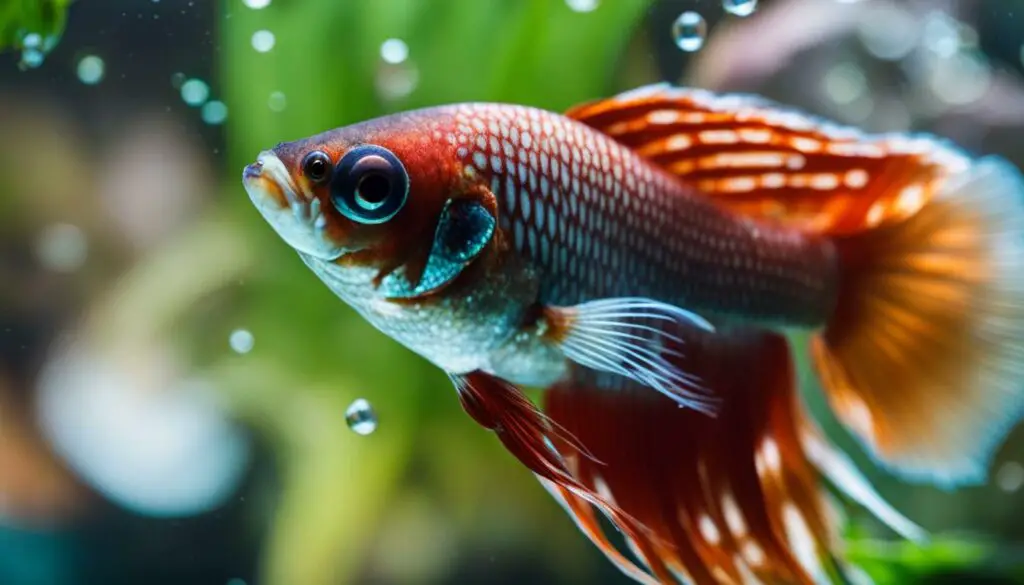
Non-Medicated Treatment Options
If you’re looking to treat Popeye in your Betta fish without medication, there are several non-medicated options you can try. These remedies can also be used to prevent the condition from occurring in the first place.
1. Epsom Salt Bath
One effective remedy for Popeye is an Epsom salt bath. Epsom salt has natural healing properties that can help reduce inflammation and promote healing.
How to administer:
| Step | Instructions |
|---|---|
| 1 | Add 1 teaspoon of Epsom salt per gallon of water to a separate container |
| 2 | Transfer your Betta fish to the container and let it soak for 10-15 minutes |
| 3 | Gently pat dry your Betta fish with a clean towel and return it to its tank |
Repeat this process daily until you notice an improvement in your Betta fish’s condition.
2. Tea Tree Oil
Tea tree oil has natural antibacterial properties that can help prevent infections and promote healing in Betta fish with Popeye.
How to administer:
- Add 1-2 drops of tea tree oil per gallon of water to your Betta fish’s tank
- Repeat this process every other day for up to a week
3. Keep the Tank Clean
One of the best ways to prevent and treat Popeye is to keep your Betta fish’s tank clean. Regular water changes and tank maintenance can prevent the buildup of harmful bacteria and reduce the risk of infections.
By implementing these non-medicated treatment options, you can help your Betta fish recover from Popeye and prevent future occurrences. However, if the condition does not improve, it’s important to seek professional veterinary care.
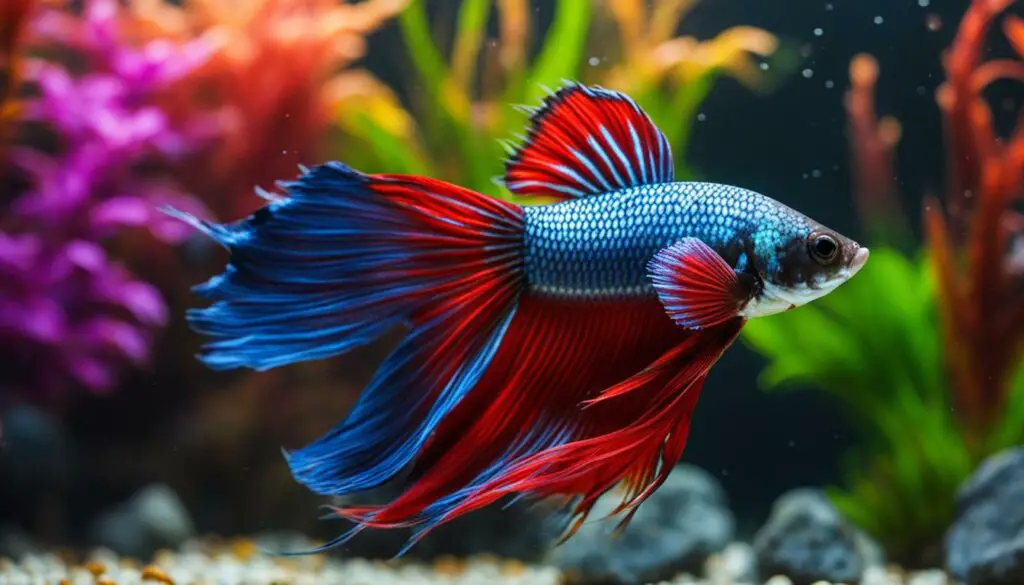
Medicated Treatment Options
If your Betta fish’s Popeye condition does not improve with non-medicated treatments or has progressed to a severe stage, it may be necessary to seek medical intervention. The medication prescribed by a veterinarian will depend on the underlying cause of the condition. Common types of medication used for Popeye in Betta fish include:
| Medication Type | Application Method | Potential Side Effects |
|---|---|---|
| Antibiotics | Added to the tank water or administered orally | Can disrupt the beneficial bacteria in the tank and lead to antibiotic resistance if used excessively |
| Steroids | Administered orally or through injection | Can increase the risk of other infections, suppress the immune system, and cause side effects such as lethargy and bloating if overdosed or used for too long |
| Epsom Salt | Added to the tank water | Can cause dehydration and irritation if not applied correctly or overdosed |
It’s crucial to follow the veterinarian’s instructions carefully and not to overdose or abruptly stop medication before the recommended treatment period is over. Sudden changes in medication can cause harm to your Betta fish and lead to complications.
It’s also important to monitor your fish’s behavior and appetite while undergoing medical treatment. If you notice any adverse side effects, contact your veterinarian immediately.
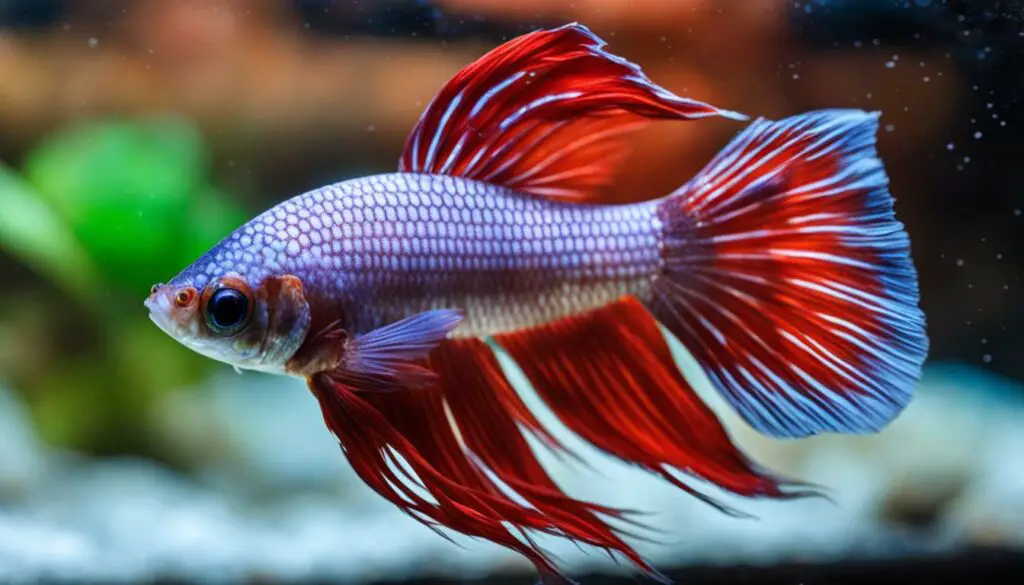
Professional Veterinary Care
If your Betta fish’s Popeye does not improve or worsens despite your best efforts, it may be necessary to seek professional veterinary care. A fish veterinarian is best equipped to diagnose and treat the condition and help your fish on the road to recovery.
When looking for a veterinary professional, seek out someone who has experience treating fish. Not all veterinarians may have the knowledge or resources to treat fish effectively.
During a consultation, the veterinarian will examine the fish and may perform additional tests to determine the underlying cause of the Popeye. Treatment options may include antibiotics, anti-inflammatory medication, or surgery.
It’s essential to follow the veterinarian’s advice closely to ensure the best possible outcome for your Betta fish. With proper care and attention, it’s possible to help your fish recover and return to their healthy, happy selves.
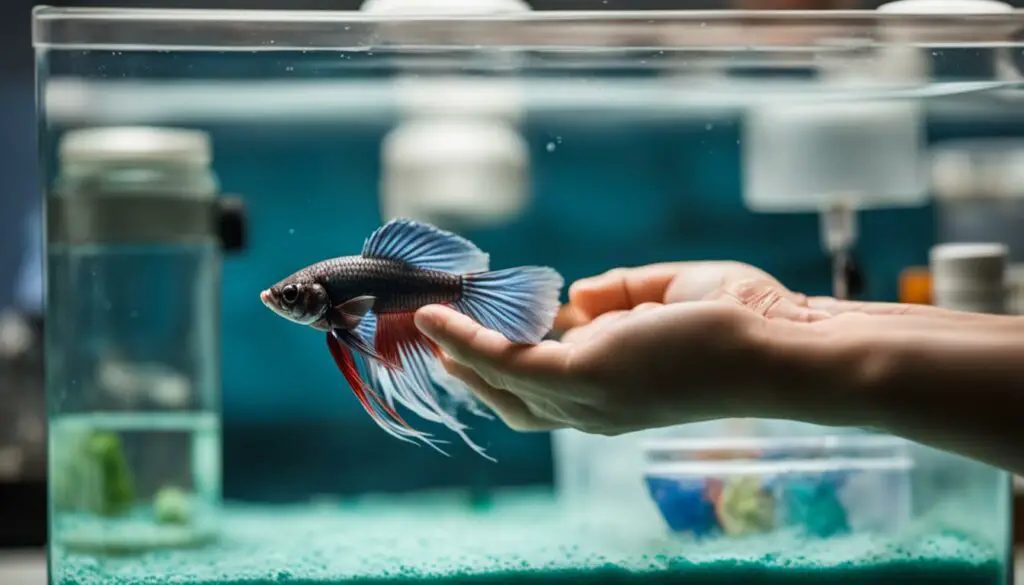
Preventing Future Occurrences of Popeye
Prevention is the best cure for Popeye in Betta fish. By implementing the following measures, you can decrease the risk of your fish developing this condition.
Avoid Overfeeding
Overfeeding your Betta fish can lead to health issues, including Popeye. Feeding them once or twice a day, with a proper diet, helps prevent overfeeding and related problems.
Keep the Tank Clean
Keeping your Betta fish’s environment clean is crucial to their health and well-being. Regular water changes and tank maintenance can help prevent infections and diseases.
Choose Compatible Tank Mates
While Betta fish can live with other fish, not all fish are compatible. Some fish can carry diseases that can spread to your Betta fish. Research and choose compatible tank mates to prevent potential illnesses.
Quarantine New Fish
Before introducing new fish to your Betta fish’s tank, quarantine them for about two weeks to ensure they are healthy and free from any diseases.
Monitor Your Betta Fish’s Health
Regularly monitor your Betta fish’s health and behavior. Early detection of Popeye or any other health issues can increase the chances of a successful recovery.
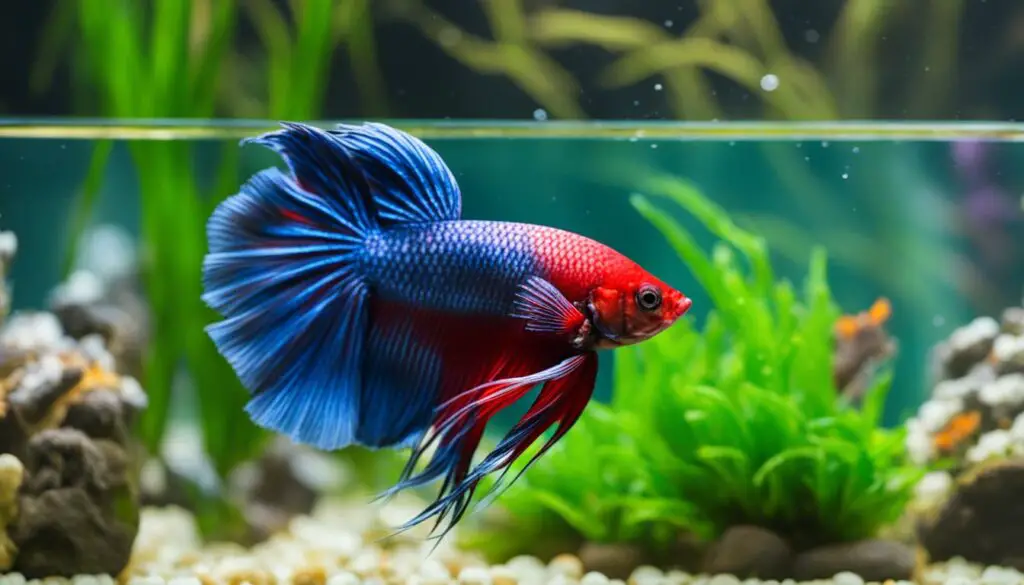
Following these steps can help prevent future occurrences of Popeye in your Betta fish. However, if you notice any symptoms, act promptly and seek proper treatment to ensure the well-being of your beloved pet.
Supporting Recovery and Overall Fish Health
Once you have treated Popeye in your Betta fish, it’s important to support their recovery and maintain their overall health. Here are some tips:
- Continue monitoring: Keep a close eye on your Betta fish for any signs of relapse or other health issues.
- Water changes: Regular water changes are crucial for maintaining good water quality. Aim to change around 25% of the water in your Betta fish’s tank weekly.
- Healthy diet: Providing a balanced and nutritious diet is key to keeping your Betta fish healthy. Offer a variety of high-quality pellets, frozen or live foods.
- Reduce stress: Stress is a common trigger for Popeye in Betta fish. Reduce stress by providing hiding spots, avoiding sudden changes in the tank, and keeping the tank away from high traffic areas.
- Address underlying issues: Popeye can be a symptom of other health issues. If you suspect your Betta fish may have an underlying condition, consult with a professional veterinarian.
By following these tips, you can help support your Betta fish’s recovery and maintain their overall health and well-being.

Conclusion
Treating Popeye in Betta fish requires patience, care, and attention to detail. By following the steps outlined in this guide, you can provide the ideal environment for healing, identify potential underlying issues, and choose the best treatment options available – whether non-medicated or medicated.
Preventing future occurrences of Popeye is also essential; regular tank maintenance, proper feeding, and maintaining a stress-free environment are all critical elements to keeping your Betta fish healthy and happy.
Remember, seeking the advice of a professional veterinarian is always an option if the condition does not improve. With ongoing care and attention, you can support your Betta fish’s recovery, maintain their overall health and well-being, and prevent future occurrences of this common eye condition.
FAQ
What is Popeye in Betta fish?
Popeye is a condition that affects the eyes of Betta fish, causing them to become swollen and protrude from the head. It is usually caused by bacterial or parasitic infections, poor water quality, or physical injury.
How can I tell if my Betta fish has Popeye?
Symptoms of Popeye in Betta fish include swollen or bulging eyes, cloudy or discolored eyes, loss of appetite, and lethargy. If you notice these signs, it’s important to take prompt action.
How do I create the ideal environment for healing?
Maintaining clean water conditions is essential for healing. Regularly test and adjust water parameters, provide a properly sized tank with appropriate filtration, and consider adding stress-reducing elements like plants and hiding spots.
What should I do if my Betta fish has Popeye?
Start by ensuring optimal water conditions and maintaining a stress-free environment. If the condition persists or worsens, consider using natural remedies like aquarium salt or commercial treatments specifically designed for Popeye.
When should I seek professional veterinary care?
If your Betta fish’s condition does not improve or deteriorates despite your best efforts, it is advisable to consult a fish veterinarian. They can provide a proper diagnosis, recommend appropriate medications, and guide you through the treatment process.
How can I prevent future occurrences of Popeye?
To reduce the risk of Popeye in Betta fish, maintain clean water conditions, avoid overcrowding the tank, feed a balanced diet, and monitor for any signs of illness or stress. Regularly inspect your fish for any physical injuries and promptly address any issues that arise.
How long does it take for a Betta fish to recover from Popeye?
The recovery time can vary depending on the severity of the condition and the effectiveness of the treatment. With proper care and treatment, Betta fish can start showing signs of improvement within a week or two.
Can Popeye be fatal for Betta fish?
If left untreated, Popeye can lead to more serious complications and potentially be fatal for Betta fish. It is important to address the underlying causes and provide appropriate treatment as soon as possible to improve the chances of a full recovery.
Are there any natural remedies for Popeye in Betta fish?
Yes, some natural remedies can help alleviate Popeye in Betta fish. These may include adding aquarium salt to the water, keeping the water clean, and using herbal treatments like tea tree oil or Indian almond leaves. However, it’s important to use these remedies with caution and follow proper dosage instructions.
Can I use human eye drops to treat Popeye in my Betta fish?
Human eye drops are not recommended for treating Popeye in Betta fish. The ingredients and dosage may not be appropriate for fish and could potentially cause harm. It’s best to use treatments specifically designed for aquarium fish or seek advice from a fish veterinarian.

